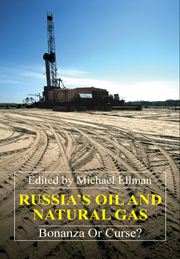Book contents
- Frontmatter
- Contents
- List of Tables and Figures
- Preface
- A Overview
- B Financial Flows
- C Economic Policy Issues
- 5 Sustaining Growth in a Hydrocarbon-based Economy
- 6 The Road to Spontaneous Diversification
- 7 Economic Growth and the Mobilization Model
- 8 The Importance of Geography
- D Political Issues
- List of Contributors
- Index
- More Titles in the Series
5 - Sustaining Growth in a Hydrocarbon-based Economy
from C - Economic Policy Issues
Published online by Cambridge University Press: 05 March 2012
- Frontmatter
- Contents
- List of Tables and Figures
- Preface
- A Overview
- B Financial Flows
- C Economic Policy Issues
- 5 Sustaining Growth in a Hydrocarbon-based Economy
- 6 The Road to Spontaneous Diversification
- 7 Economic Growth and the Mobilization Model
- 8 The Importance of Geography
- D Political Issues
- List of Contributors
- Index
- More Titles in the Series
Summary
Given its economic structure, Russia is bound to remain a heavily hydrocarbondependent economy for some time to come. This reality largely defines the two most important challenges facing Russian policy-makers as they seek to create a framework for sustained growth. These are managing a resourcebased economy successfully and facilitating economic diversification over time. This chapter first looks at the policies and developments that have been underlying Russia's strong post-crisis growth performance, before setting out the policies that Russia—as a resource based economy—would have to follow in order to sustain high growth rates.
The Policies and Developments Underlying Growth
The most important economic policy choice underlying the expansion since 1998 was the adoption of a prudent fiscal stance—in sharp contrast to the pre-crisis period. From 2000 to 2004, federal budgets were drafted to aim for surpluses based on conservative oil price assumptions. This approach not only delivered sizeable surpluses but also a budget that was balanced over the oil price cycle. Simulations show that the federal budget would have remained in rough balance even with oil prices unchanged at USD 19/bl (Urals) throughout the period. Indeed, there would have been only a relatively moderate deficit, not exceeding 2 per cent of GDP, if oil prices had fallen to very low levels (Kwon 2003, Ahrend 2004a). To be sure, fiscal responsibility was facilitated by growing revenues due to favourable terms of trade and strong growth.
- Type
- Chapter
- Information
- Russia's Oil and Natural GasBonanza or Curse?, pp. 105 - 126Publisher: Anthem PressPrint publication year: 2006
- 1
- Cited by



